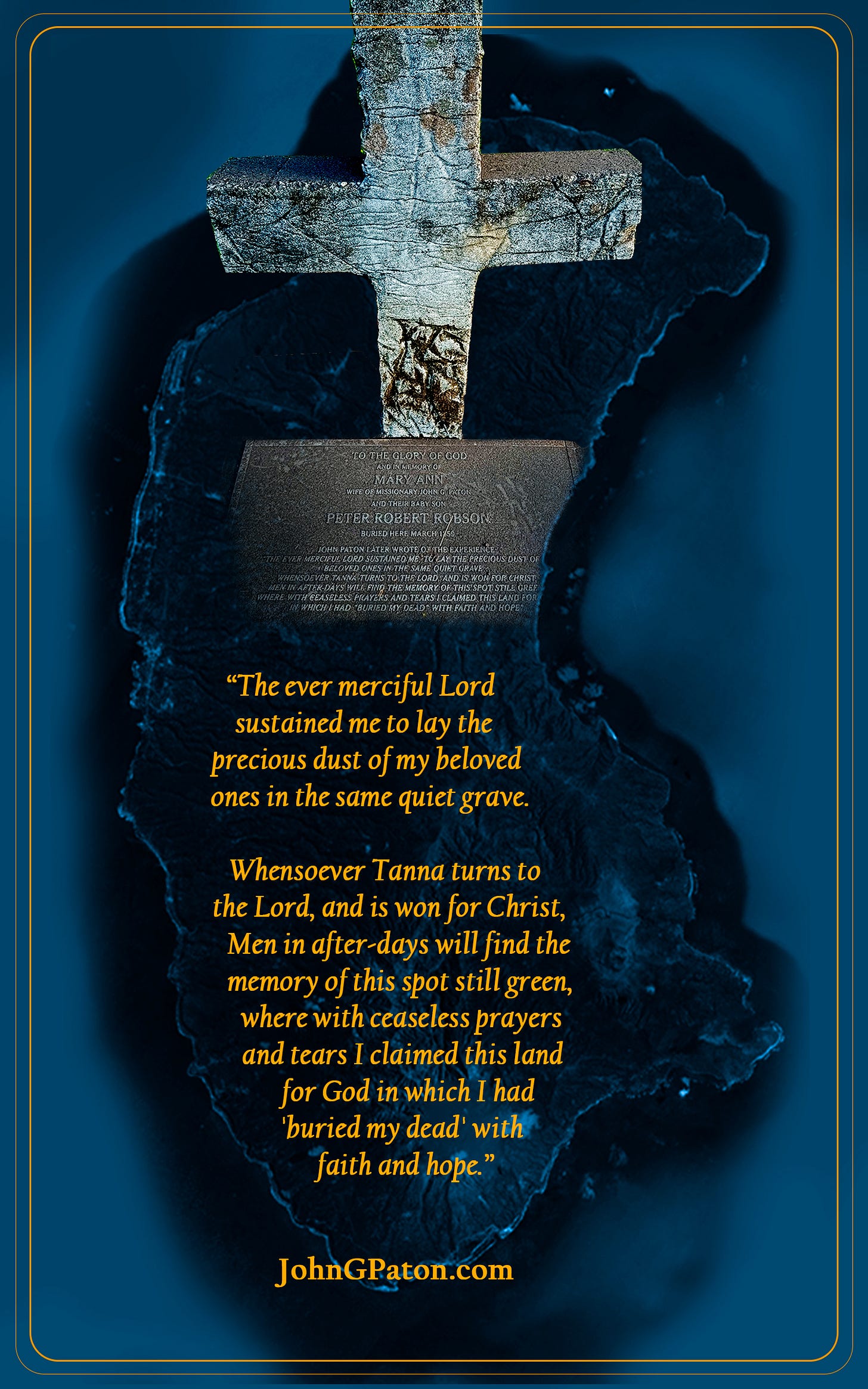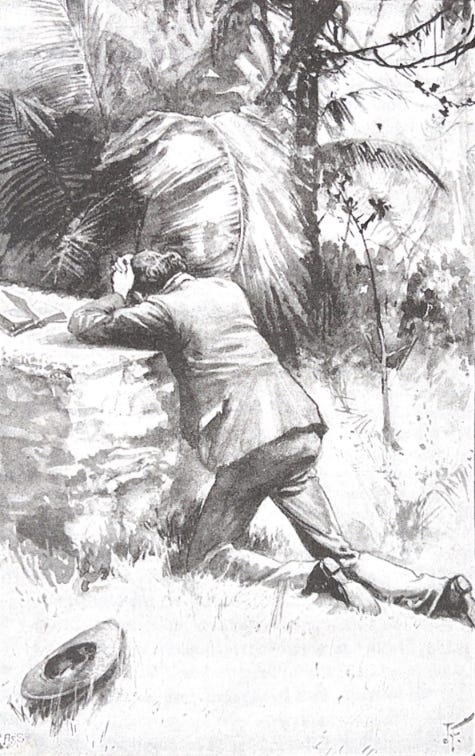My dear young wife, Mary Ann, and I had landed on Tanna on the 5th November, 1858, in excellent health and full of all tender and holy hopes. On the 12th February, 1859, she gave birth to our son; for two days or so both mother and child seemed to prosper, and our island-exile thrilled with joy!
But the greatest of sorrows was treading hard upon the heels of that joy! My darling’s strength showed no signs of rallying. She had an attack of malaria and fever, a few days before her labor; on the third day or so thereafter, it returned, and attacked her every second day with increasing severity for a fortnight. Diarrhea ensued, and symptoms of pneumonia, with slight delirium at intervals; and then in a moment, altogether unexpectedly, she died on the 3rd of March, 1859.
To crown my sorrows, and complete my loneliness, the dear baby boy, whom we had named after her father, Peter Robert Robson, was taken from me after one week’s sickness, on the 20th March. Let those who have ever passed through any similar darkness as of midnight feel for me; as for all others, it would be more than vain to try to paint my sorrows!
Stunned by that dreadful loss, in entering upon this field of labor to which the Lord had Himself so evidently led me, my reason seemed for a time almost to give way. Malaria and fever, too, laid a depressing and weakening hand upon me, continuously recurring, and reaching oftentimes the very height of its worst burning stages. But I was never altogether forsaken.
The ever-merciful Lord sustained me, to lay the precious dust of my beloved Ones in the same quiet grave, dug for them, close by at the end of the house. I undertook all of this with my own hands, despite my breaking heart!
I built the grave round and round with coral blocks, and covered the top with beautiful white coral, broken small as gravel; and that spot became my sacred and much-frequented shrine, during all the following months and years when I labored on for the salvation of these savage Islanders amidst difficulties, dangers, and deaths. But for Jesus, and the fellowship He vouchsafed me there, I must have gone mad and died beside that lonely grave.
Whensoever Tanna turns to the Lord, and is won for Christ, men in after-days will find the memory of that spot still green—where with ceaseless prayers and tears I claimed that land for God in which I had “buried my dead” with faith and hope.
Sorrow and love make me linger a little to share the last letter my wife wrote to her family back home:
Tanna, 28th December, 1858:
My dear Father, Mother, and Sisters,
When I wrote last, we were just about to leave Aneityum for Tanna, the sphere of our future labors. One can have no idea of the dark and degraded state of these poor Heathen, unless really living amongst them. Still we trust that the cloud which has so long enveloped Tanna will soon be rolled away, and the light of the Sun of Righteousness irradiate this dark land. We have been here about two months, and so far the people among whom we live appear to be friendly.
A number of the local priesthood reside in the neighborhood of the Volcano, from whom we anticipate much opposition, as they know that wherever the Missionary gains a footing among the people, their influence is lost. The Tannese are very avaricious. If one renders the least assistance, he demands a most exorbitant pay; 'indeed, we can hardly satisfy them. We have a number of male, but very few female visitors, the latter being just slaves to do all the work.
The men disfigure their faces with red and black paint, and always carry spears and clubs. At first I was quite shocked with their appearance, but one soon becomes accustomed to such sights. They likewise possess powder and muskets; guns and tobacco being the chief objects of their ambition. Indeed, such is their degraded condition that, were not the power and grace of God all-sufficient, one might almost despair of ever making any impression on them.
All the Natives are in a state of entire nudity, with this exception, that females wear short petticoats made of grass. Young girls are very fond of beads, and sometimes have their necks quite covered with them. They likewise bore holes in the ear, from which they suspend large rolls (circles) of tortoise shell. Two or three little girls come about me, whom I am teaching to sew and sing; but no great good can be accomplished till we master their language. We have picked up a good many words, and I trust, with the blessing of God, will soon be able to speak to them of things pertaining to their everlasting peace.
Port Resolution is a most beautiful Bay. I have never seen such a lovely spot. Indeed, everything around delights the eye, and ‘only man is vile.’ Our house is at the head of the Bay, on the foundation of Dr. Turner’s, from which he had to fly fifteen years ago. The sea, at full tide, comes within a few yards of the door. Mr. Copeland is staying with us now. During the Rainy Season, he is to be sometimes with us, and at other times with Mr. Mathieson, who is in delicate health.
The thermometer averages from 80° to 85°. The Rainy Season having now set in, it is not likely we will have any opportunity of sending or receiving letters for three or four months. I am longing very much to hear from you. I can hardly realize that nine months have rolled away since I left Bonnie Scotia! How many changes will take place before I again revisit it! Both my husband and I are in excellent health, and, though the heat feels oppressive, we like the climate very well.
A Happy New Year to you all, and many happy returns! I am writing hurriedly, as a vessel has called, and leaves tomorrow morning. I expect to get all the news when you write, for my interest in and affection for home and friends have not in the least abated.
Now I must conclude; with love to you all, and to all my old companions, believe me ever your loving daughter and sister,
"Mary Ann Paton.”
And her last words were:
“Oh, that my dear mother were here! She is a good woman, my mother, a jewel of a woman.”
Then, observing Mr. Copeland nearby, she said:
“Oh, Mr. Copeland, I did not know you were there! You must not think that I regret coming here, and leaving my mother. If I had the same thing to do over again, I would do it with far more pleasure, yes, with all my heart. Oh, no! I do not regret leaving home and friends, though at the time I felt it keenly.”
Soon after this, looking up and putting her hand in mine, she said:
“J. C. wrote to our Janet saying, that young Christians under their first impressions thought they could do anything or make any sacrifice for Jesus, and he asked if she believed it, for he did not think they could, when tested; but Janet wrote back that she believed they could, and (added she with great emphasis) I believe it is true! ”
In a moment, altogether unexpectedly, she fell asleep in Jesus, with these words on her lips.
“Not lost, only gone before to be forever with the Lord,”— my heart keeps saying or singing to itself from that hour till now.
Coming March 7, 2024 (Kindle) and May 24, 2024 (Amazon): JohnGPaton.com






